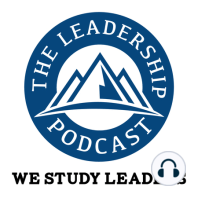33 min listen

TLP157: Agility - perspectives from the former Director of the National Security Agency (NSA) and Commander of US Cyber Command
TLP157: Agility - perspectives from the former Director of the National Security Agency (NSA) and Commander of US Cyber Command
ratings:
Length:
62 minutes
Released:
Jul 3, 2019
Format:
Podcast episode
Description
Adm. Michael Rogers, Retired Four Star Admiral and Former Director of the National Security Agency and Commander of the U.S. Cyber Command discusses risk and reward, and the difference in both. THe Admiral also discusses accountability, the things that concern him regarding ethics in the new world of AI, and one of the best lessons he ever learned. Key Takeaways [1:20] Mike Rogers retired from the Navy in 2018 after nearly 37 years of service, rising to the rank of Four Star Admiral. [5:49] As a Four Star Admiral, Michael’s life was all about risk and reward and how they’re intertwined. The risk is there to help us prioritize challenges to achieve an outcome that generates our reward. Michael would tell his team if they were uncomfortable with risk, they are in the wrong career. [8:06] In the military, risk in viewed as two parts: Risk of mission and ability to achieve the outcome, and mission to force. On the private sector side, you worry about risk of mission but not so much the mission to force. In the civilian world, we also see reputational risk. [13:21] Michael defines accountability as the alignment of authority, resources, and responsibility. In the business world, we typically are less comfortable giving people authority, and we need to truly empower people to make them accountable. [18:15] Michael recounts an example of how the Commander in Chief provided the ultimate example of accountability. [20:23] The biggest challenge as a leader isn’t the technology, it’s the people, ethos and culture. [22:23] AI and machine learning will be huge advantages, and if used correctly and supervised when appropriate, we will be able to help us parse through vast data and free up time and energy. [27:41] We must think how we can effectively communicate in a way that helps the decision maker generate a decision. [35:33] What Michael loved about the special operations approach was that it wasn’t about your rank or position, it was about the value you bring and how one maximizes speed, agility and communication within the chain of command. [40:35] Leadership is so much more challenging, we can’t fully replace the experience of connection and crisis response with AI or machines. [42:34] Michael shares an experience that inspired him to forever be combat ready and impacted him for the rest of his career. [52:19] Adaptability is as much about ethos and culture as process, and should be based upon what as the greatest impact on completing the mission. [54:55] We have the ability to shape workforce behavior by how we incentivize performance. [57:33] Think about the dynamics that shape your own work culture, and the backgrounds and values of who works there. Quotable Quotes “I have always enjoyed the challenge.” “You can’t truly hold people accountable if you don’t give them the authority they need to actually do the job.” “It’s not about me, it’s about the mission and the men and women that do the hard work.” “How do we incentivize behavior that we say we value?” Cyber Command National Security Agency Auburn University Kellogg School of Management | Northwestern Department of Defense Society for Information Management AEGIS Weapon System TLP 101: General Stanley McChrystal on What Connects Us Puzzle Palace Bio: Mike Rogers retired from the U.S. Navy in 2018 after nearly 37 years of naval service rising to the rank of four-star admiral. He culminated his career with a four-year tour as Commander, U.S. Cyber Command and Director, National Security Agency. In those roles he worked with the leadership of the U.S. government, the Department of Defense and the U.S. Intelligence community as well as their international counterparts in the conduct of cyber and intelligence activity across the globe. He also assisted in the development of national and international policy with respect to cyber, intelligence and technology – including extensive work with corporate leadership in the Finance, IT, Telecommu
Released:
Jul 3, 2019
Format:
Podcast episode
Titles in the series (100)
TLP006: Get to Know the Hosts of The Leadership Podcast: The inspiration behind this endeavor and what listeners should expect to gain from it. by The Leadership Podcast